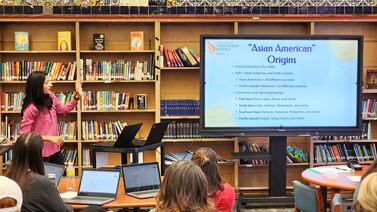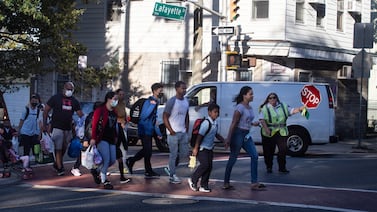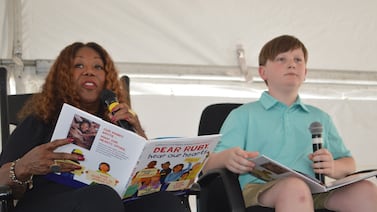A group of Chicago parents and advocacy organizations are urging the mayor’s office to keep the public better informed about upcoming appointments to the city’s Board of Education.
In a Wednesday letter, the advocates, who are primarily focused on education and disability justice, asked the mayor’s office to do an open call for members, increase transparency around the qualifications for selection, and outline the administration’s goals for the composition of the school board. Along with the letter, the group also asked to meet with the mayor.
Four of seven current school board terms are set to expire on June 30, but Mayor Brandon Johnson could replace all of them like his predecessors did. He will be the last mayor to appoint members of the school board before Chicagoans get the chance to vote for their school board members.
In 2024, the board will expand from seven to 21 people — a much larger school governing body compared to other major cities — with the mayor appointing the school board president and 10 of those seats. By 2027, the board will be fully-elected.
Until then, said Miriam Bhimani, Johnson should live up to his campaign promise to “stand for the people.”
“Standing for the people means that you need to trust and respect the deep reservoirs of experience and knowledge that families have in a city, and you do that by being transparent,” said Bhimani, a researcher for one of the letter’s signees, FOIA Bakery, which focuses on transparency.
In a statement to Chalkbeat, a spokesperson for the mayor’s office said that “As a Chicago Public Schools parent and former educator who fought for an elected representative school board, Mayor Johnson is a partner to many of these individuals and organizations seeking education justice. He sees them, he hears them, and he will ensure that appointments to the Chicago Board of Education reflect the principles they value.”
While on the campaign trail, Johnson told Chalkbeat that in the transition to an elected board, “We need candidates who are deeply invested and knowledgeable from the communities served to have a fair chance to win races to influence the education of their children.”
In a press conference last week, Chalkbeat also asked Johnson when he planned to appoint school board members.
“We’re going through a process now where we are reviewing those who are currently on the board, and those who ultimately align with our vision,” Johnson said. He also said his deputy mayor for education Jen Johnson is working with him on appointing school board members.
Advocates say they want that vision to be more clearly defined and communicated to the public. Bhimani said the administration has stayed “opaque” about the process so far.
“What does the CPS board do and why do they do it? We really need the answer to that question from this administration,” Bhimani said. “What are the metrics of success and who are they doing it for? Are they there for the taxpayers? Are they there for children in the system?”
The letter sent Wednesday listed priorities for experience and expertise that board members should have, including in bilingual education, undocumented students, unhoused students, students who are incarcerated, and students with disabilities.
Terri Smith, a parent advocate who has a daughter with hearing loss, said she wants board members who have expertise and personal experience with students with disabilities.
“Unless you consciously decide how you want to comprise the board, then all you’re doing is hunting and pecking for solutions to things and hoping that you come up with the right one,” said Smith, who signed the letter. “Even if you do research, it’s still taking more time than it should if you had a content expert right there on the board.”
Cassie Creswell, director of Illinois Families for Public Schools, also stressed experience with students with disabilities as a priority. She said that’s especially important after a state investigation found Chicago Public Schools did not fully train staff on use of restraint and seclusion, which put students with disabilities particularly at risk. An April letter from the Illinois State Board of Education outlined violations, including untrained staff using outlawed methods of restraint.
Chicago Public Schools said in a statement that top district and Board of Education leadership has been “transparent about the need for improved systems, strategies, and services” to support students with disabilities, and that the district will “remain committed” to working with ISBE, parents and advocacy groups to develop improvements.
Creswell said that before the transition to elections, the appointed school board must be prepared to address this issue.
“There is a backlog of things to deal with that are extremely urgent right now – the district’s recognition status with the state being at stake because of unresolved special education issues that involve literally life and death matters for children,” Creswell said. “These board appointments, that’s who we’re legally putting in charge of addressing this, so it really matters.”
Creswell said transparency in the appointment process is not only crucial for the upcoming vacancies but for the transition to a hybrid and then fully elected board. She wants meetings to be more accessible. Currently, the board meets during weekday working hours in the Loop, which Creswell said prevents many people from attending.
Smith also said this is a time to set precedents.
“When elections happen, we want people to feel that it’s important to come forward and say ‘I’m electable because I bring this to the table, not just because I’m rah rah or I have a political affiliation.”
Max Lubbers is an intern for Chalkbeat Chicago. Contact Max at mlubbers@chalkbeat.org







